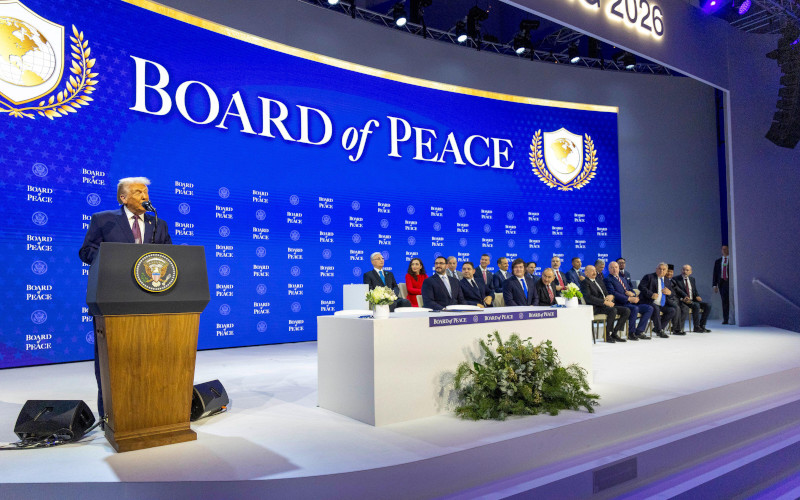
Pearlcasts
As we review 2025, the temptation is to look for neat summaries and settled conclusions.
Go to Pearlcasts
2 March 2026
Louise Adler sets the record straight on Adelaide Writers' Week
The Adelaide Writers’ Week (AWW) debacle might have served as a “life lesson” to politicians and lobbyists about the risks involved in interfering with the independence of arts organisations. But as we have seen at Newcastle and the Sydney Writers Festival some are apparently slow learners.

2 March 2026
Trump’s dangerous war without consent
The United States is now at war with Iran without congressional approval, and the costs – strategic, human and constitutional – could be catastrophic.

2 March 2026
Jeffrey Sachs on the US and Israel war with Iran
The US is fighting to maintain hegemony, in a war that will have shocking global ramifications, says Columbia University Professor Jeffrey Sachs in conversation with Glenn Diesen.

2 March 2026
From Minneapolis to Africa – how states fracture when legitimacy fails
From Nigeria to Ethiopia, African conflicts show how federations unravel when force loses accountability. Minnesota’s standoff with Washington reveals the same warning signs.
2 March 2026
Large-scale forest thinning has limited benefits but major financial and ecological costs
Mechanical thinning is increasingly promoted as a fire control solution. But new research finds its effectiveness is mixed and the ecological, climate and financial costs often outweigh the benefits.

2 March 2026
Australia, refugees and the colonial hangover in the Asian century
From offshore detention to uneven moral outrage abroad, Australia’s political instincts still reflect an older colonial logic – one that sits uneasily in an Asian century shaped by multipolar power and shifting global authority.

2 March 2026
Regions, not postcodes: the structural reality of rural public education
Educational disadvantage in Australia is often framed as urban or socioeconomic. But across regional and remote communities, public schools operate with structurally thin staffing, services and support – and the consequences are cumulative.

1 March 2026
The Russia–Ukraine war: Australia’s unanswered questions. Part 1
As the Russia–Ukraine war enters its fifth year, hard questions are overdue. In Part 1 of a two-part series, Michael McKinley examines the strategic history behind the conflict and Australia’s uncritical alignment with a US-led approach that offered Ukraine little prospect of victory.

1 March 2026
Michael Caine’s voice is iconic. Why would he sell that to AI?
Michael Caine’s decision to license his voice to an AI company is about more than technology – it's about class, identity and what happens when a culturally “enregistered” voice becomes a digital product.

1 March 2026
Environment: A hotter Middle East, a warming Arctic and heatwaves that won’t retreat
Arab nations face a very hot future, more severe heatwaves will continue for 1,000 years after we reach net zero, and changing land use has contributed to global warming, now global warming is damaging the land.

1 March 2026
Lord of the Flies in the age of Trump
William Golding’s Lord of the Flies remains a bleak meditation on power, fear and civilisation. In today’s politics, its allegory feels newly unsettling.
Read our series
Latest on Palestine and Israel

2 March 2026
Louise Adler sets the record straight on Adelaide Writers' Week
The Adelaide Writers’ Week (AWW) debacle might have served as a “life lesson” to politicians and lobbyists about the risks involved in interfering with the independence of arts organisations. But as we have seen at Newcastle and the Sydney Writers Festival some are apparently slow learners.

27 February 2026
No Plan B: Trump’s Gaza plan sidelines justice and law
Donald Trump’s so-called Peace Board for Gaza promises reconstruction but delivers domination. With Palestinians excluded and international law sidelined, the plan exposes the urgent need for a credible alternative grounded in justice, accountability and self-determination.

26 February 2026
Foreign fighters for Israel – beyond the reach of Australian law?
While the government vows to block the return of Australian women and children from Syria, hundreds of Australians who have served with the Israeli Defence Force face little scrutiny on their return – despite serious allegations of war crimes in Gaza.

25 February 2026
Terrorism – a blow back from western violence in Muslim countries
Terrorism dominates political debate and media coverage in Australia despite causing relatively few deaths. The deeper causes – western military violence, state power, and selective moral language – are rarely examined.

24 February 2026
Death tolls, settlements and the closing space for a two-state future
New research confirms that far more Palestinians have been killed in Gaza than first acknowledged, while settlement expansion and political rhetoric point to deeper structural realities.

23 February 2026
Globalisation of occupation: when genocide becomes an international project
Thousands of foreign nationals are serving in Israel’s military with the legal tolerance of their home states, while peaceful protest against the war is criminalised. This double standard exposes a deep failure of international law and accountability.

23 February 2026
Islamophobia and strategic blindness: Australia in the Asian century
Australia seeks deeper integration with Asia while continuing to send cultural and political signals that undermine trust among its closest neighbours. In a region shaped by Islam, history and proximity, this contradiction carries strategic consequences.

21 February 2026
Board of Peace plans 5,000-person military base in southern Gaza
Leaked contracting documents detail plans by the Board of Peace to build a large military base in southern Gaza, including armoured towers, bunkers and a “Human Remains Protocol”.

Israel's war against Gaza
Media coverage of the war in Gaza since October 2023 has spread a series of lies propagated by Israel and the United States. This publication presents information, analysis, clarification, views and perspectives largely unavailable in mainstream media in Australia and elsewhere.
Download the PDFLatest on China

28 February 2026
Modi in Israel, Tokyo’s shift on arms, and Duterte at The Hague – Asian Media Report
India and Israel deepen ties, Japan edges towards lethal arms exports, Duterte faces crimes-against-humanity charges, Indonesia weighs its Gaza role, Bangladesh confronts rule-of-law reform, and China’s unofficial K-pop ban shows signs of strain.

27 February 2026
Shen Yun and Falun Gong – belief, propaganda and division
The evacuation of the Prime Minister over a threat linked to a Shen Yun tour has drawn attention to the Falun Gong movement and its political evolution.

25 February 2026
How a nuclear test that never happened became news
A US allegation that China conducted a secret nuclear test was widely reported despite clear evidence to the contrary, highlighting how security claims are too often treated as facts before they are proven.

Support our independent media with your donation
Pearls and Irritations leads the way in raising and analysing vital issues often neglected in mainstream media. Your contribution supports our independence and quality commentary on matters importance to Australia and our region.
DonateMore from Pearls and Irritations
Latest letters to the editor
Hansonites are amongst us and they vote
Richard Llewellyn — Colo Vale
Assertions are not evidence of a crime
David Thompson — CLAYTON
Do some mothers matter more than others?
Hal Duell — Alice Springs
What’s the difference?
Stelios Piakis — NSW









